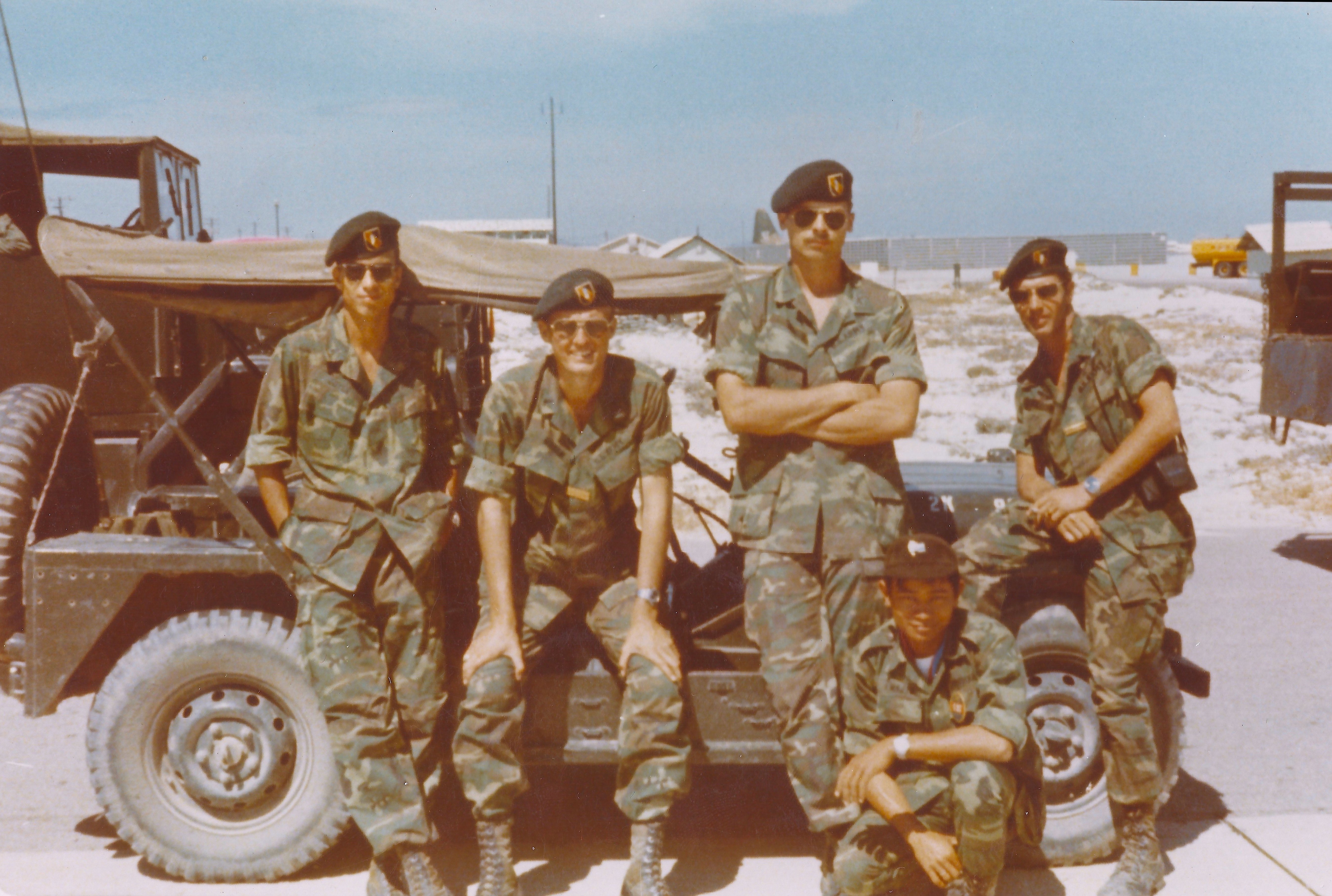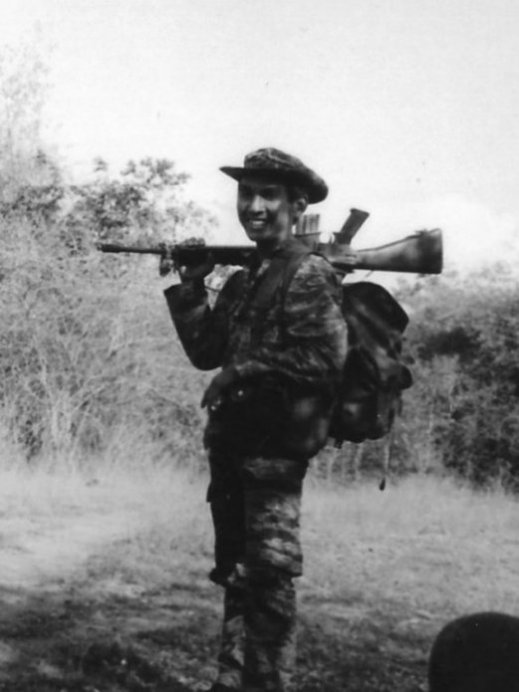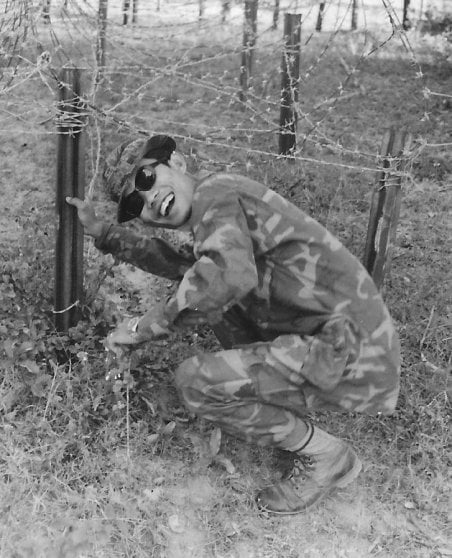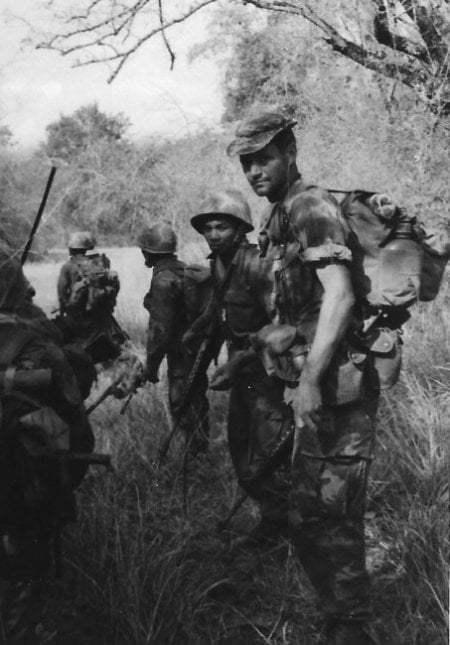
 A Minnesota PBS Initiative
A Minnesota PBS Initiative
Americans are traditionally very limited in their ability to speak other languages. This was a critical problem in Vietnam and it remains a problem in current deployments.
I was assigned to a Special Forces Camp, B-51, at Dong Da Thin, Vietnam in early November 1970. In December we and two other B Team Special Forces camps received the mission to train the Cambodian Army. This was the FANK program. Battalions of about 500 men would be shipped to each camp, one per month to start a three-month training cycle before being returned to Cambodia to fight the North Vietnamese and Cambodian Communists, the Khmer Rouge. Training and organizing indigenous forces is a fundamental aspect of the Special Forces mission. The Special Forces “A” Team is the fundamental training/advisory unit. To accomplish our mission, one “A Team” advised each Cambodian Battalion, but to conduct the training three training committees were organized: Weapons, Tactics, and General Subjects.

Chan (kneeling) waiting to pick up a battalion of Cambodians at the Cam Ranh Bay Air Force Base. I am 2nd from the right with crossed arms.
The fundamental problem existed of finding interpreters/translators to assist with the training. In our unit we had a number of Cubans who were native Spanish speakers, 2 who spoke Navajo, and a few with the various languages of South Vietnam. Others spoke European languages, but only the 2 French speakers were occasionally useful in training the Cambodians.
So what do we do? Dong Ba Thin was mostly a Vietnamese Special Forces training camp, but there was no love between the Vietnamese and the Cambodians. When the Cambodians entered the war in 1970 they unleashed their ancient hatreds on the ethnic Vietnamese in Cambodia, murdered many thousands and sent their bodies floating down the Mekong River to Vietnam. Several Cambodians said to me, “When you leave Vietnam come to Cambodia and help us kill Vietnamese.” I was never sure if they were only talking about the North Vietnamese.
Soon translators/interpreters were showing up at the camp. I’m not sure what the hiring process was, who sought them out, or who actually hired them. I’m pretty sure that on some level the VNSF were involved.
Some of the interpreters were pretty good and some left a lot to be desired. Some of the Americans were able to work effectively through the interpreters and some just couldn’t alter their textbook Ft. Benning school presentation format to be effective.
As best I could understand it most of our interpreters were at least part Cambodian and I’m sure spoke both Cambodian and Vietnamese well, if not both as native speakers, but they had varying degrees of English language proficiency so you just never knew if what you were saying was getting properly translated.
There are four or five of the translators that I remember. Two of my favorites were Chan and Hoi.
The fundamental problem existed of finding interpreters/translators to assist with the training.
Chan was very hard working and dedicated. He was one of the first translators to arrive at the camp. He seemed to translate everything well with a lot of enthusiasm and he seemed to really like his work. I was always happy and confident to work with Chan and I trusted him.
Hoi was a later hire. The story was that he had been a Buddhist monk but had kicked out of the monastery for some reason. When he arrived his head was shaved, he was extremely bashful, looked and acted very feminine. He was so shy and seemingly embarrassed to communicate that it was initially rather awkward to work with him. After a month or so of hanging out with the guys in town and in camp Hoi toughened up. He remained generally quiet but very steady and was dependable and seemed to do a pretty good job translating.
I liked working with Hoi. In the field he seemed to have a very good tactical sense and good survival skills. I always wondered where he had picked up that knowledge and those skills. It wasn’t in the Monastery.

Hoi

Sophia, goofing off in barbed wire.
Another translator was Sophia. Like Chan he was proficient but much more outgoing to the point of being cocky. I don’t remember working with him too much but his cockiness caused some to distrust him.
One day I was teaching a class on retrograde operations. I was pretty pleased with how things were going and I thought I was being pretty effective. I didn't have much confidence in the translator for that class. To help him, I tried to use the blackboard effectively and I simplified my language as best I could, avoiding unnecessary technical terms and American army jargon. After an hour we took a break and one of the Cambodian officers who spoke a little English came up to me and said that for an hour all the translator had been saying over and over was “pay attention or you are going to die!” I tried to get another translator but couldn’t. What could I do? I felt like that morning I had completely failed the Cambodians and was wasting my time and theirs.
Word choice could be problematic. The first time we taught a class on the M-16 rifle whenever we mentioned the rifle bolt we noticed that the Cambodians were snickering. We shortly found out that “bolt” in Cambodian is a slang term for a penis. OK, so what was another word we could use in the future to describe that part of the rifle?
Eventually some of the Americans started picking up Cambodian. One excellent NCO was Sergeant Reagan from Texas. He was one of my favorite NCO’s; smart, proficient, dependable, a good sense of humor, and with a great aptitude for picking up languages. It wasn’t long before he was teaching classes in Cambodian. The Cambodians loved him as he loved them.
Because everything was shutting down many people were filtering through our camp to finish their year in country after their camp had closed. This created a revolving door that prevented people from developing a good relationship or some level of language proficiency with Cambodian.

Sergeant Reagan, who quickly learned to speak Cambodian.
I very much liked the Cambodians and I feel terrible about the whole war in Cambodia and resulting “Killing Fields.” I’m sure that most of the Cambodian soldiers I worked with, especially the officers all died, most likely murdered by the Khmer Rouge along with their families.
I often think about our translators and what their fate might have been. After we left, did they go to Cambodia and meet a horrible death? Were they captured by the Communists and sent to years of hard labor in “re-education camps” because they had worked for the Americans? Did they escape to the United States with other refugees? Did some of them show their secret loyalty as Viet Cong and join the “Liberation”? We could never get beyond the fundamental problem of doubt about who we were employing, who we could really trust, and what our translators were really saying and thinking.
In the end we abandoned them, so trust works both ways.
Doug Bekke
1st Lieutenant
Special Forces, Detachment B-51, 5th Special Forces Group
Submitted From: Minneapolis, MN

Primary Location During Vietnam: Dong Ba Thin, II Corps, Vietnam 
Story Subject: Military Service
Military Branch: U.S. Army
Dates of Service: 1968 - 1971
Veteran Organization: Special Forces Chapter XX, American Legion
Unit: Special Forces, B-51
Specialty: Infantry Officer
Story Themes: 1968, 1969, 1970, 1971, American Legion, Cambodia, Cambodians, Dong Ba Thin, Douglas Bekke, FANK, II Corps, Khmer Rouge, Killing Fields, Language, Look, Special Forces, Special Forces Camp B-51, Translation, Translator